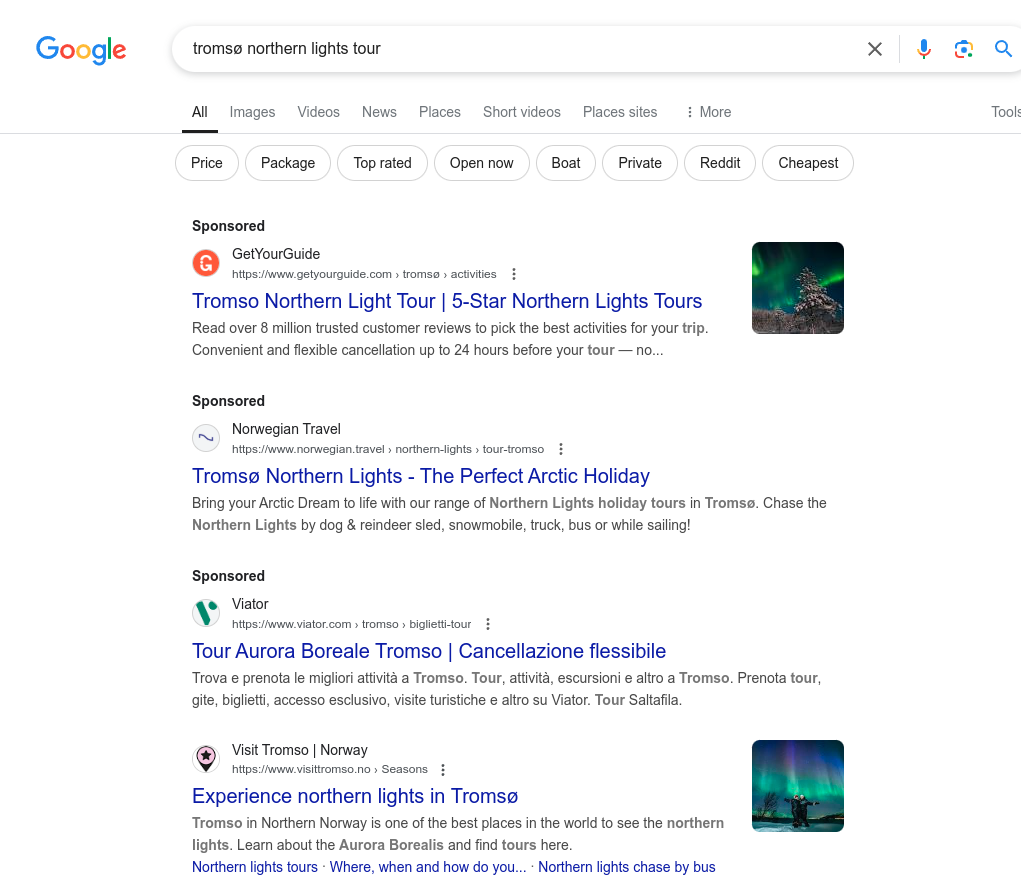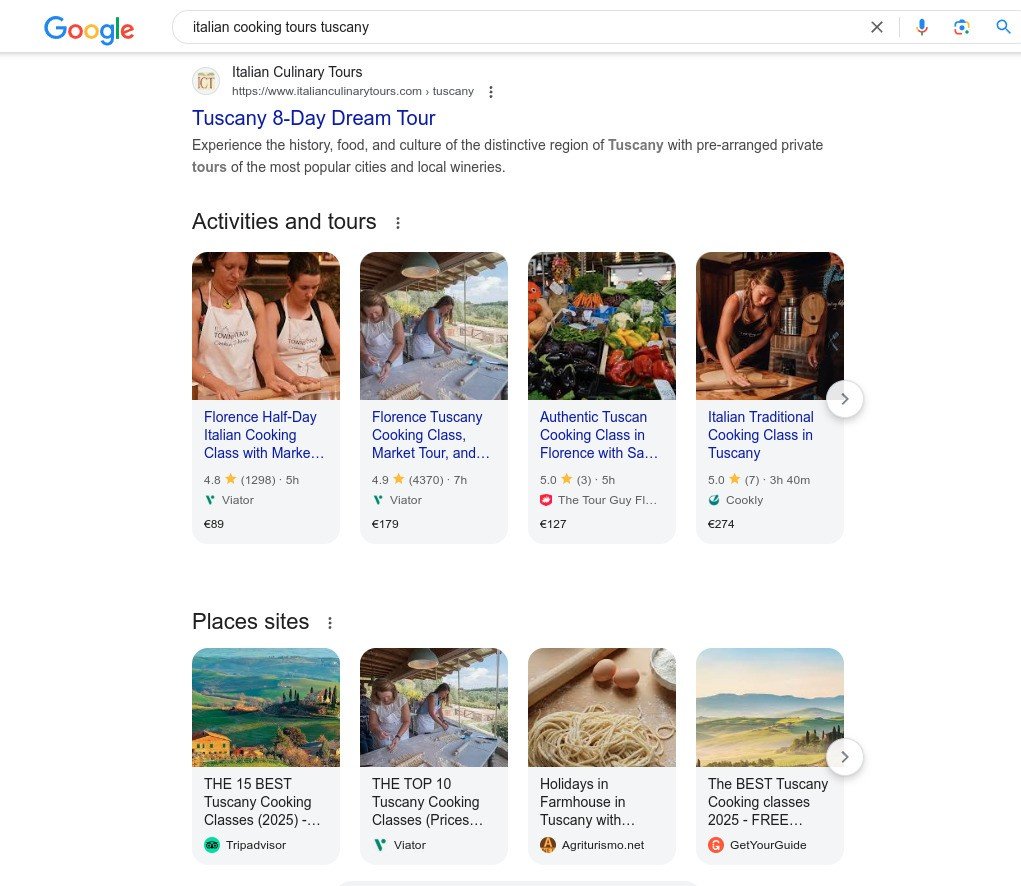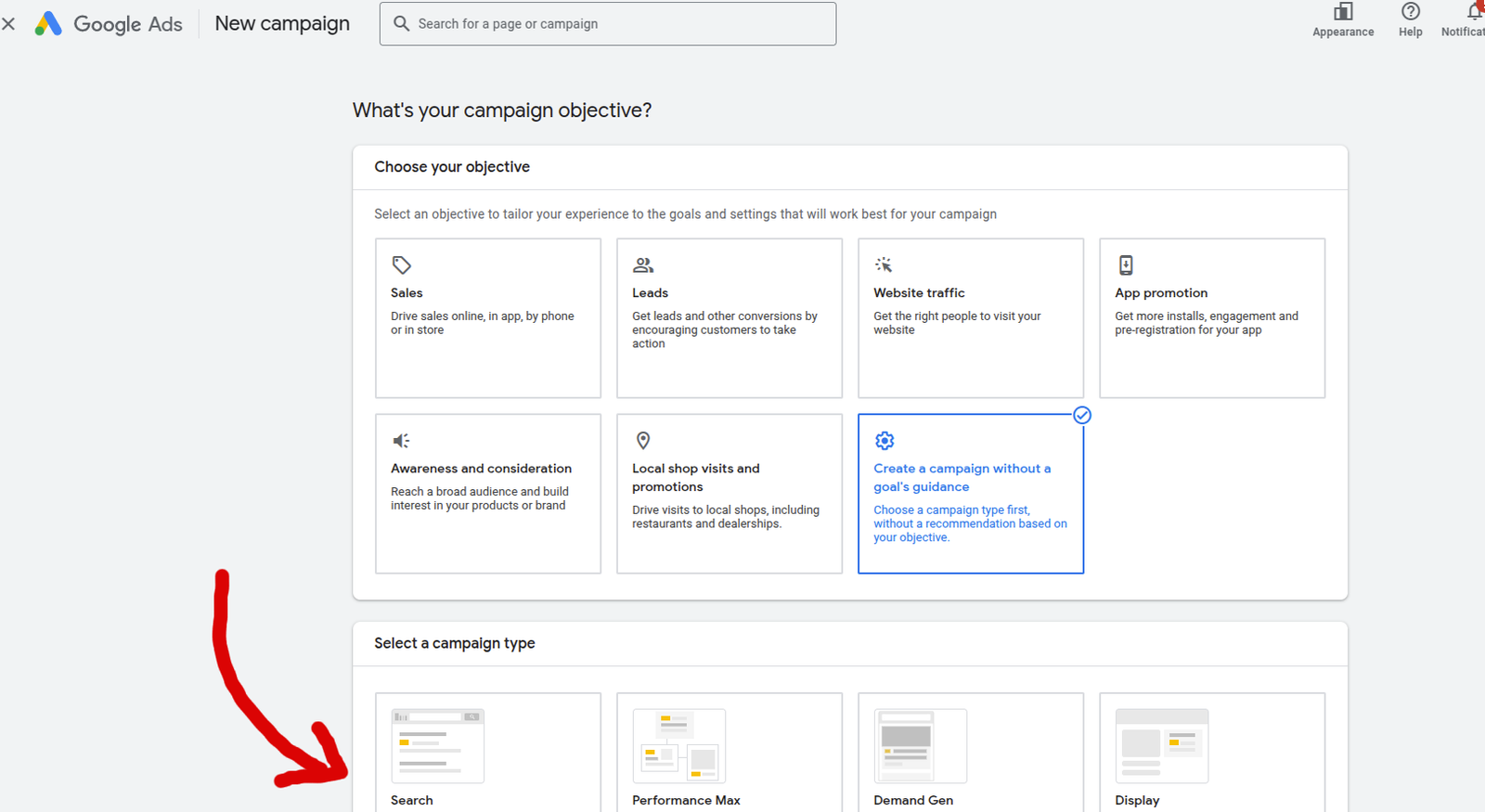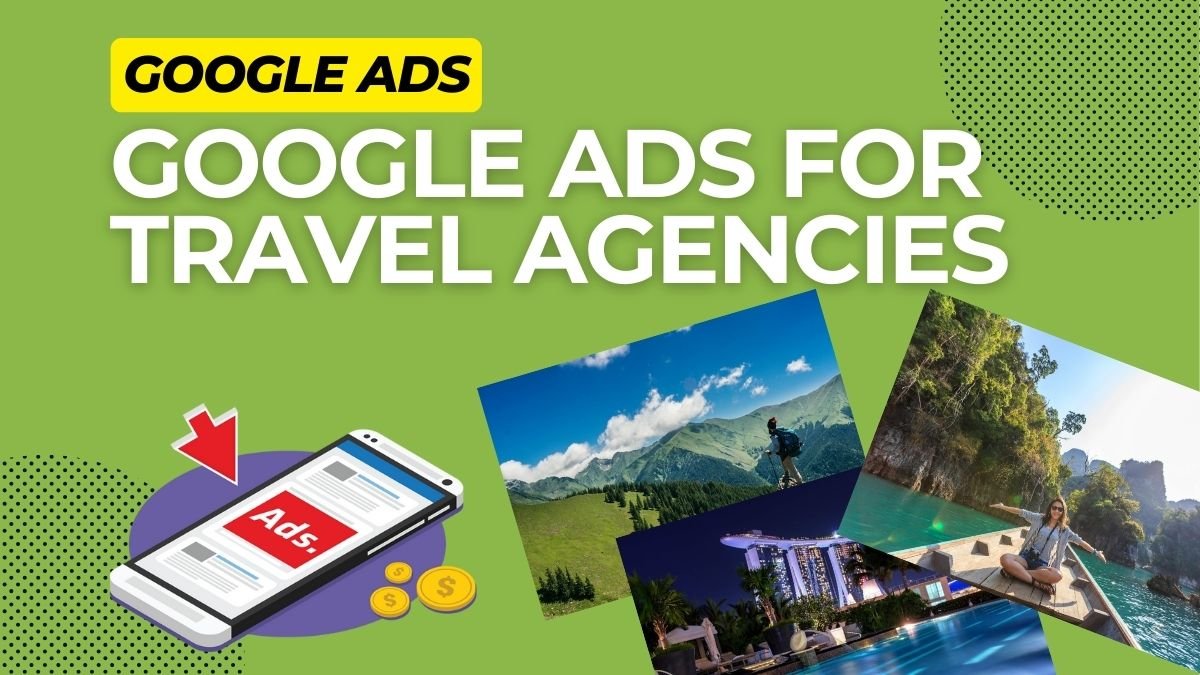As a travel agency owner, you've seen countless ads. But many of these fail to capture your ideal customer – those with clear travel intent.
That's where Google Ads (former AdWords), comes in. It targets travelers actively seeking unique experiences like a "new york city tour." Proven strategies drive qualified clicks, lower costs, and boost bookings.
Get ready to transform your online advertising and decisively outshine competitors with precise, performance-driven campaigns today without wasting money.
Table of Contents
- Advertise your agency ONLY to active searchers
- How Google Ads works
- What to offer the market when starting out
- How to pick the right keywords
- The Google auction system
- Is $500 per month a good budget for beginners?
- Reduce dependence on platforms like Tripadvisor
- The website or landing page makes all the difference
- Conclusions
Advertise your agency ONLY to active searchers
When it comes to online advertising, visibility among the right audience is everything. Google Ads is a unique platform that empowers travel agencies to reach travelers who are actively searching for specific experiences.

For instance, imagine a user looking for a “tromsø northern lights tour” – a highly specific search indicating a clear intent to visit, Tromsø, the Norwegian city located in the northernmost region of Europe to admire the spectacular northern lights.

Google Ads allows you to bid on keywords like this, ensuring that your ad appears in front of prospects who are already primed for booking an unforgettable tour.
Consider the scenario of organized tours in various destinations: a guided journey through the historic streets of Rome, an adventurous trek in the Himalayas, or an intimate wine tasting experience in Tuscany.
These searches reveal that modern travelers desire precision in their travel planning.
Moreover, Google Ads’ targeting options enable you to refine your reach by location. Whether promoting a boutique tour in a small village or an expansive package that spans the globe, the platform’s granular targeting ensures that your ad is seen by those who matter most.
Unlike social media, which generally caters to latent demand, Google Ads meets the conscious need of users actively planning their trips.
With examples such as an “italian culinary tour” or “paris museum guided tour”, the ads can be customized to suit distinct niches. This hyper-focused approach not only increases your visibility but also improves your return on investment by connecting you directly with motivated travelers.


In today’s market, being visible is not enough; being visible to the right people is key. Google Ads offers that precision, making it the unrivaled tool for travel agencies looking to capture high-intent customers.
How Google Ads works
Google Ads works by matching your ad campaigns with users’ search queries based on targeted keywords and geographical filters.
It allows travel agencies to create highly specific campaigns that speak directly to the needs of potential clients.
The platform uses a bidding system that considers both your bid amount and the quality of your ad, ensuring that even if you’re not the highest bidder, a well-optimized ad can still appear.
This combination of bid and quality is vital, as it prevents your budget from being wasted on irrelevant clicks. Agencies can tailor campaigns in multiple ways: setting daily budgets, choosing between manual and automated bidding, and selecting audience demographics.
Moreover, Google Ads offers various campaign types, including Search, Display, Video, and Performance Max. For travel agencies new to the platform, starting with Search campaigns is recommended. They are straightforward, cost-effective, and deliver fast results.

The system’s transparency allows you to analyze the performance of each keyword, geographic region, and ad copy variation. With real-time data and detailed analytics, you can adjust your campaigns to maximize performance.
The platform also supports ad extensions, which provide additional information such as contact details and special offers, making your ads more attractive. Google Ads’ power lies in its ability to convert a generic search into a precise match for your service.
By focusing on the conscious demand—users actively searching for travel experiences—you secure an audience that’s already invested in planning their next adventure. In a market where timing and relevance are everything, Google Ads gives you the tools to be seen by those who are ready to travel.
What to offer the market when starting out
Starting with Google Ads, as with any online or even physical business promoted via the internet, requires you to identify a very specific customer target and a manageable geographic area.
For a travel agency, this means focusing on what you can offer best.
If you specialize in tours to Japan, for example, you might design campaigns around experiences that resonate with Japanese culture and iconic landmarks. Consider a tour package that includes a day trip to Mount Fuji—users searching for “mt fuji day trip from tokyo” are already expressing clear intent.
Similarly, if you organize tours from San Francisco to Yosemite National Park, targeting phrases like “yosemite tour from san francisco” helps narrow your audience to those truly interested in that experience. This focused approach minimizes wasted spend on clicks from users with unrelated intentions.
The key is to test, measure, and scale gradually.
Starting small allows you to refine your ad copy, website, and overall strategy without overextending your budget. By concentrating on a specific niche, you reduce competition and increase relevance.
Over time, as data accumulates, you can expand your targeting with confidence. This incremental approach not only ensures that your advertising dollars are well spent but also builds a strong foundation for long-term growth.
How to pick the right keywords
Selecting the right keywords is critical for any successful Google Ads campaign. Relying solely on generic guidance can lead to underperformance. Instead, a detailed and thoughtful approach to keyword selection will protect your budget and improve ad relevance.
Below are some strategies to ensure you target keywords that truly align with your travel agency’s offerings.
1. Consider the location type and position
When your agency operates in a metropolitan area, start by targeting specific keywords that reflect the unique experiences you provide.
For example, if you’re promoting a tour in China that focuses on the Great Wall rather than Shanghai’s urban attractions, your ad should feature phrases like “great wall tour.” This helps exclude generic searches such as “day trips from shanghai,” ensuring your ad appears only to those interested in the historic site.

By narrowing your focus, you avoid spending on clicks that do not convert and better serve a niche audience.
2. Prefer lower-cost keywords, if possible
Using tools like Keywords Planner, you can gauge the cost per click of various keywords.
Look for keywords that have a lower cost yet align perfectly with your travel offerings. For instance, if “mt fuji day trip from tokyo” meets the search intent, it might have a lower competition level than broader terms.
Focus on keywords that combine specificity with affordability: a targeted approach can significantly enhance your ROI. This strategy ensures that every euro spent is optimized for conversion and relevance.
3. Do not use overly generic keywords from the start
Avoid launching campaigns with overly generic keywords such as “tour china” or “china holidays.”
While these terms attract high search volume, they also invite irrelevant traffic. Starting with a tightly focused keyword strategy allows you to test and adjust your ad campaigns effectively. As you gather data, you may gradually introduce broader terms.
Begin with narrow, high-intent keywords to build a reliable customer base, and only expand once your campaigns are finely tuned. By doing so, you mitigate the risk of attracting the wrong audience and can scale confidently over time.
This thoughtful keyword selection process is a cornerstone of successful, sustainable advertising.
The Google auction system
Google Ads operates on an auction system, meaning that every time a user conducts a search, an instantaneous auction determines which ads are shown.
The auction considers both your bid and the quality of your ad.
Essentially, you set a maximum amount you’re willing to pay per click (or you let the system decide), but your ad’s actual cost may be lower if your quality score is high.
The quality score is determined by factors such as ad relevance, landing page experience, and historical performance. This system ensures that even if your bid is modest, a well-crafted and relevant ad can secure a prime position on the search results page.
For travel agencies, this means that strategic keyword targeting and compelling ad copy can make a significant difference in your visibility.
It’s important to note that paying less does not necessarily equate to lower visibility; you might still appear for related search terms or lower down on the page.
Focus on enhancing ad quality and relevance, as these factors can compensate for a lower bid. The auction system, therefore, rewards advertisers who invest time in optimizing their campaigns rather than solely relying on high bids.
This level playing field is particularly advantageous for niche travel agencies that cater to specific markets, allowing them to compete with larger entities by providing more targeted and useful information.
Ultimately, understanding and mastering the auction dynamics is essential for maximizing your campaign’s efficiency and effectiveness.
Is $500 per month a good budget for beginners?
Budgeting is a common concern among Google Ads advertisers.
For locations with less competitive ad markets or lower cost-per-click, an investment of around 10–15 dollars per day may be sufficient to initiate effective campaigns.
In contrast, highly competitive markets might require daily budgets ranging from $20 to $100, depending on location and seasonality. With these figures in mind, a monthly investment of approximately $500 per month can be a very solid starting point.
This budget is designed to test, learn, and gradually scale your campaigns as you gather insights on ad performance and conversion rates. The beauty of Google Ads is its flexibility; you can adjust your spending in real time based on performance data.
For a travel agency, it is crucial to remember that the initial investment is part of a broader strategy. You are not just buying clicks but building a sustainable digital presence that directly drives bookings.
Begin with a modest budget, monitor the results carefully, and incrementally increase spend as your ads prove their value. With this approach, $500 a month can evolve into a much larger return on investment as your campaigns become more refined and effective.
Reduce dependence on platforms like Tripadvisor
One of the hidden advantages of Google Ads is that it offers travel agencies an alternative to relying solely on third-party platforms like Tripadvisor. When you invest in your own advertising campaigns, every booking is driven directly to your website.
This gives you full control over customer interactions, data collection, and the overall booking process. By reducing dependence on external platforms, you avoid high commission fees and maintain a direct relationship with your customers.

This not only improves profitability but also allows you to tailor the entire customer journey—from initial inquiry to final booking—exactly how you want it.
Moreover, by shifting your focus from platform-based visibility to your own digital presence, you can reinvest the savings from commission fees into further optimizing your marketing strategy.
You enhance brand recognition and loyalty as users engage directly with your site. In the long run, owning your customer acquisition process builds trust and creates opportunities for upselling and cross-promotions.
The freedom to manage your digital marketing strategy with full transparency and control is a significant competitive advantage in today’s market.
The website or landing page makes all the difference
A well-designed website or landing page is the cornerstone of a successful online advertising strategy. For travel agencies, this digital space must be intuitive, visually appealing, and highly informative.
Visitors should immediately understand what unique travel experiences you offer, and the site should guide them effortlessly toward making a booking.
The user experience is paramount. Navigation should be simple, with clear calls-to-action that encourage potential customers to explore your tour options, check availability, and ultimately reserve their spot.

Additionally, incorporating a robust booking system can streamline operations for both you and your staff.
High-quality images that showcase scenic landscapes, hotel accommodations, and local attractions can greatly influence a visitor’s decision to book. Furthermore, regular updates to your content and offers are essential to keep your website relevant and engaging.

Optimizing your site for SEO is also crucial; by targeting organic search traffic, you can supplement your paid advertising efforts and reduce overall marketing costs. Essential elements:
-
Navigation: a clear and intuitive menu that directs visitors seamlessly
-
Visuals: high-quality images that reflect the true experience
-
Content: concise, engaging text that conveys value
-
Booking system: an integrated, easy-to-use tool that simplifies reservations
Utilizing advanced platforms to manage these components not only enhances the visitor experience but also provides valuable insights into user behavior.

This data can then be used to refine both your website and your ad campaigns, creating a virtuous cycle of continuous improvement. Ultimately, a dedicated landing page that is both informative and aesthetically pleasing can be the difference between a casual browser and a confirmed booking.
Conclusions
Google Ads offers travel agencies an unparalleled opportunity to reach high-intent customers. By carefully targeting the right keywords, optimizing your campaigns, and maintaining a strong online presence, you can drive bookings directly from your website.
Focus on precision, test rigorously, and scale gradually—the results will speak for themselves.
Are you looking for someone to manage your Google Ads campaigns for your hotel? Click here to find out more about our services!

